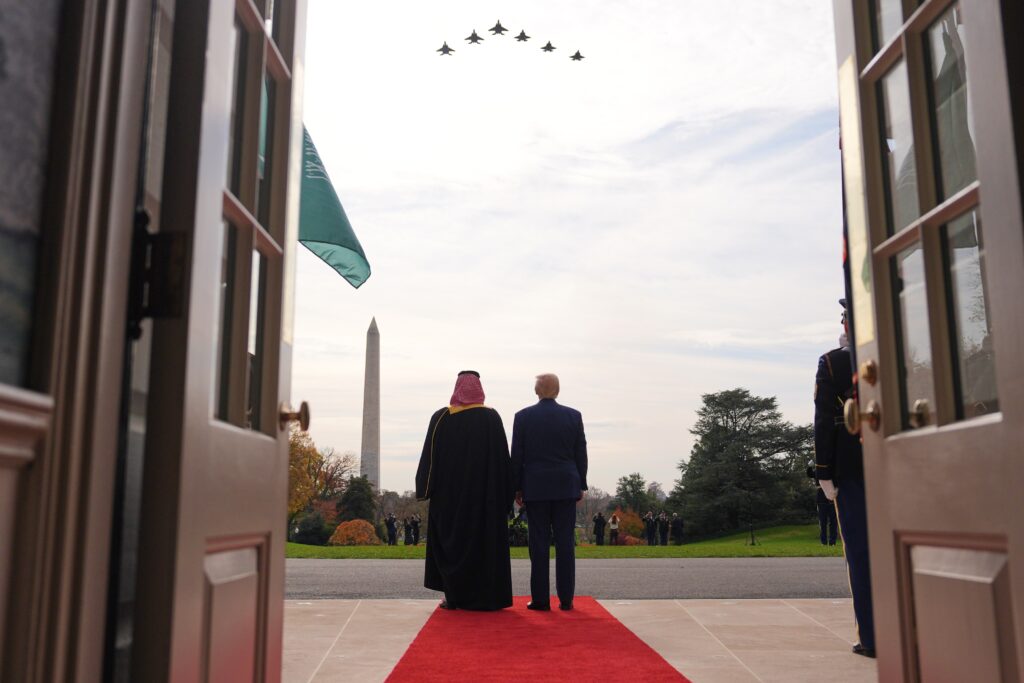Crown Prince Mohammed bin Salman is “the future king” of Saudi Arabia, as President Donald Trump said while introducing him Tuesday. The transition could come soon, and MBS, as he’s known, could reign for many decades. His continued success in modernizing the kingdom is crucial for the future security of the Middle East.
When you take a coldhearted look at American interests, those are the baselines in assessing MBS’s visit to Washington this week. The Saudi leader also has the blood of my colleague and friend Jamal Khashoggi on his hands. That will never change. MBS said Tuesday that Khashoggi’s death was “painful” and a “huge mistake.” It was worse than that. But it’s not the end of the story.
Here’s what resonates with me, beyond Khashoggi’s death: MBS is probably the most important player in the region now. He has succeeded in deradicalizing Muslim extremists in his own country, and he’s working to do the same elsewhere. He wants to normalize relations with Israel and Iran. Perhaps most important, he has decided to link Saudi Arabia’s future with the United States.
Trump was eager to claim the glory on Tuesday in the Oval Office. But as MBS said, he is making a bet that will last for “decades.” If this alliance works, Saudi Arabia and its modernizing neighbors, the United Arab Emirates and Qatar, could provide a corridor for U.S. power connecting with Africa and Asia. This America-led buffer against China’s expanding “belt and road” ambitions could produce a safer world for everyone.
Israel should benefit, too, but there will be costs. Trump’s decision to sell F-35s to the kingdom might erode the “qualitative military edge” that Washington has long promised Israel. MBS said Tuesday that he wants to be part of the Abraham Accords and normalize relations with Israel, but first he wants a “path” to a future Palestinian state, which may take many years. Israel should be safer, as well, if the U.S. and its Gulf allies carry out their plan to rebuild Gaza and reform the Palestinian Authority in the West Bank. But that will reduce Israel’s leverage on the Palestinian issue.
It must be said: MBS has harnessed his country to an erratic partner in Trump. The Saudi in his Bedouin garb looked almost embarrassed as Trump trashed former president Joe Biden and ranted about journalists. MBS’s comments about the “huge mistake” of Khashoggi’s murder sounded restrained compared to Trump’s attack on the Post columnist as an “extremely controversial” journalist. “Things happen,” Trump said.
What was the pathway that took MBS to the Oval Office Tuesday and, probably soon, to the royal throne in Riyadh? It was cleared by a bulldozer. From the moment King Salman became monarch in 2015, his ambitious son pushed to transform a country he saw as corrupt, moribund and enfeebled by Muslim fundamentalism. I described MBS in a 2016 profile as someone who “could jump-start the kingdom — or drive it off a cliff.” He was, I noted, “the kind of prince that Machiavelli might conjure.”
MBS had three goals back then, according to a close adviser. He wanted to control the wildly corrupt spoils system of the ever-expanding royal family. He wanted to restore some of the openness of Saudi society that had existed before the 1979 Iranian revolution empowered the extremist Saudi Muslims who helped finance fellow Saudi Osama bin Laden. And he wanted to push the kingdom to the center of a more dynamic Arab world.
To an astonishing extent, MBS has accomplished these goals. But not without a lot of ruthless breakage. He stripped the power of former crown prince Mohammed bin Nayef and then replaced him in 2017; he locked up wealthy Saudis in the Ritz Carlton in Riyadh later that year until they agreed to surrender some of the loot they had acquired; he launched a costly war against the Houthis in Yemen.
And finally in October 2018, according to the CIA, he authorized his operatives to capture or kill a meddlesome journalist who wrote for The Post, whose criticisms aides had told MBS were undermining his power grab.
Trump shielded MBS from accountability for that brutal act during his first term. But for the Saudis, it wasn’t a reliable partnership. When Iranian missiles struck Saudi oil facilities at Abqaiq in 2019, the administration essentially did nothing. “He thought the U.S. would throw in everything to support him,” recalls a U.S. official. “We did the absolute minimum.”
That’s why MBS is so eager for U.S. defense guarantees now and wants to purchase F-35s. He feels exposed in a region that remains unstable. He wants to play on the U.S. team, but only if he has protection.
What has surprised me most as I have watched all this unfold is Mohammed’s success in modernizing Saudi Arabia while keeping it under tight political control. I first traveled to the kingdom in 1981, and it’s hard to describe how sleepy and repressive it was. The difference now is astonishing. If you doubt it, do a Google search for “rock concerts in Saudi Arabia.”
MBS replaced the religious leadership, neutered the religious police and began offering young Saudis one of the things they’d been missing — fun. Most important, perhaps, he empowered women, allowing them to drive, play sports, travel unescorted. And he began to reform the kingdom’s legal system, a slow process because it was based on Islamic law. But even as he made these reforms, he maintained a police state where challenging the modernizing government was dangerous.
Fears that MBS’s reforms would trigger a backlash have ebbed — partly because young Saudis would resist any attempt to restore the old constraining culture. But a former diplomat explains why this story is still unfinished. A Saudi friend told him recently that he was taking his wife and mother to the theater — something that would have been impossible a decade ago. What about the father? “He’s not comfortable with this yet,” the Saudi explained.
MBS has begun to export deradicalization to other countries in the region. A source close to the crown prince tells me the Saudis have signed a memorandum of understanding with the Palestinian Authority to modernize its education system to check extremism, reform its personnel management to reduce corruption, and develop e-government to make the West Bank and a rebuilt Gaza more transparent and less prone to covert payoffs to terrorists. The Saudis have offered to play a similar role in rebuilding Syria, helping with new roads, power and water.
If there’s a dizzying quality to these reforms, that reflects the best and worst of MBS. He’s a dreamer with a whip in his hand. He is now obsessed, as are rulers in the UAE and Qatar, with the opportunities to become dominant artificial intelligence providers in a world where their cheap energy gives them a huge boost — when combined with America’s AI technology. If knowledge is power, the reverse is also true. The kingdom’s cheap energy could make its future data centers as profitable as oil wells.
In trying to think about MBS, I turned to my friend Khalid Aljabri. Few Saudis have suffered in recent years as much as his family. His father Saad was the key intelligence adviser to MBS’s rival, Mohammed bin Nayef. MBS has accused him of stealing government funds (a charge dismissed by U.S. courts) and — to pressure the family — has held two of his siblings.
Aljabri told me that a year ago, he visited the Saudi embassy in Washington at its request to deliver a letter to MBS on behalf of his family. The letter said, in part, “I am a Saudi citizen who has been exiled for too long, who hopes for the magnanimity of his leadership, who dreams of serving his homeland, and of seeing his family reunited. I am not a dissident.”
I think that’s what Khashoggi would have said to MBS, if he’d had the chance. But he never emerged from the Saudi consulate in Istanbul. History will judge what happened there. But history isn’t made up of single chapters. MBS can write new ones.
The post For a ‘future king’ in Washington, past and future each weigh heavily
appeared first on Washington Post.




